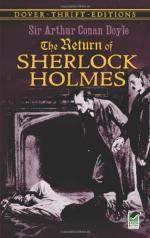“So, my dear Watson, there’s my report of a failure. And yet—and yet—” he clenched his thin hands in a paroxysm of conviction—“I know it’s all wrong. I feel it in my bones. There is something that has not come out, and that housekeeper knows it. There was a sort of sulky defiance in her eyes, which only goes with guilty knowledge. However, there’s no good talking any more about it, Watson; but unless some lucky chance comes our way I fear that the Norwood Disappearance Case will not figure in that chronicle of our successes which I foresee that a patient public will sooner or later have to endure.”
“Surely,” said I, “the man’s appearance would go far with any jury?”
“That is a dangerous argument my dear Watson. You remember that terrible murderer, Bert Stevens, who wanted us to get him off in ’87? Was there ever a more mild-mannered, Sunday-school young man?”
“It is true.”
“Unless we succeed in establishing an alternative theory, this man is lost. You can hardly find a flaw in the case which can now be presented against him, and all further investigation has served to strengthen it. By the way, there is one curious little point about those papers which may serve us as the starting-point for an inquiry. On looking over the bank-book I found that the low state of the balance was principally due to large checks which have been made out during the last year to Mr. Cornelius. I confess that I should be interested to know who this Mr. Cornelius may be with whom a retired builder has such very large transactions. Is it possible that he has had a hand in the affair? Cornelius might be a broker, but we have found no scrip to correspond with these large payments. Failing any other indication, my researches must now take the direction of an inquiry at the bank for the gentleman who has cashed these checks. But I fear, my dear fellow, that our case will end ingloriously by Lestrade hanging our client, which will certainly be a triumph for Scotland Yard.”
I do not know how far Sherlock Holmes took any sleep that night, but when I came down to breakfast I found him pale and harassed, his bright eyes the brighter for the dark shadows round them. The carpet round his chair was littered with cigarette-ends and with the early editions of the morning papers. An open telegram lay upon the table.
“What do you think of this, Watson?” he asked, tossing it across.
It was from Norwood, and ran as follows:
Important fresh evidence to hand. McFarlane’s guilt definitely established. Advise you to abandon case. Lestrade.
“This sounds serious,” said I.
“It is Lestrade’s little cock-a-doodle of victory,” Holmes answered, with a bitter smile. “And yet it may be premature to abandon the case. After all, important fresh evidence is a two-edged thing, and may possibly cut in a very different direction to that which Lestrade imagines. Take your breakfast, Watson, and we will go out together and see what we can do. I feel as if I shall need your company and your moral support today.”




